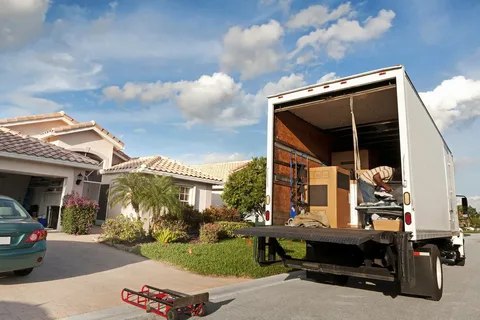What’s Included in Residential Moving Services?
Moving to a new home is an exciting yet overwhelming experience. One of the most important decisions you’ll make during this process is hiring professional movers. Residential moving services can simplify the process, but it’s essential to understand exactly what they include and how you can prepare for the big day.
In this blog, we’ll take a detailed look at what’s typically included in residential moving services and how you can prepare for a smooth and efficient move.
What’s Included in Residential Moving Services?
When hiring residential moving services, the scope of the service can vary depending on the company and the package you choose. However, most full-service moving companies offer a range of services that cover every aspect of the move. Here are the main components you can expect:
1. Packing Services
Packing can be one of the most time-consuming and stressful aspects of moving. Fortunately, many residential moving companies offer packing services. This typically includes:
- Packing Supplies: Movers provide boxes, bubble wrap, tape, and packing paper.
- Packing Assistance: Movers carefully pack your belongings, ensuring that fragile items are secured properly.
- Labeling: Each box is labeled with its contents and the room it belongs to in the new home, which makes unpacking easier.
2. Loading and Unloading
Once everything is packed and ready, the movers will take care of loading your belongings onto the moving truck. This process involves:
- Disassembling Furniture: If needed, movers will disassemble large furniture, like beds and tables, to make them easier to transport.
- Loading the Truck: Movers carefully load all boxes and furniture onto the truck, ensuring everything is secure to prevent damage during transport.
- Unloading: Upon arrival at your new home, the movers will unload the items and place them in the appropriate rooms.
3. Transportation
Residential moving services include transportation, which is a key aspect of the move. The movers will drive your items from your old home to the new one. This service typically includes:
- Truck Rental: The moving company provides the truck, which comes in various sizes depending on the amount of items you’re moving.
- Mileage: Transportation fees often include mileage, although this can vary based on the distance of the move.
4. Furniture Protection and Moving Equipment
Many professional moving services take extra steps to protect your belongings during the move. This can include:
- Furniture Pads: Movers will wrap your furniture in protective padding to prevent scratches and damage.
- Dollies and Moving Straps: Movers use specialized equipment like dollies, moving straps, and ramps to make the move smoother and safer.
5. Insurance and Liability Protection
In case of accidents, most moving companies offer insurance options to protect your belongings. The level of coverage can vary, so it’s important to discuss insurance details with the moving company beforehand. Some common types of moving insurance include:
- Basic Coverage: This often covers a portion of the value of the goods in case of damage or loss.
- Full Value Protection: This provides more comprehensive coverage, ensuring that the moving company will either repair, replace, or compensate for damaged or lost items.
6. Unpacking Services (Optional)
In addition to packing and transporting, some residential moving companies also offer unpacking services. This can help you settle into your new home quickly. Movers will unpack boxes, arrange furniture, and remove packing materials. This service is often optional and comes at an additional cost.
How to Prepare for Your Move
To ensure that your moving day goes smoothly, it’s important to prepare ahead of time. Here are some tips on how to get ready for residential moving services:
1. Create a Moving Checklist
A moving checklist helps you stay organized throughout the process. Start by listing all the tasks you need to complete, from booking the moving company to packing your belongings. Be sure to:
- Set a moving date.
- Confirm the details with the moving company.
- Plan how to pack items and what you’ll need to purchase for packing materials.
2. Declutter Your Home
Before you start packing, take the time to declutter your home. Get rid of items you no longer need or want. You can donate, sell, or dispose of unwanted items. Not only will this reduce the number of things you have to move, but it will also make packing and unpacking more manageable.
3. Pack Early (If You’re Doing It Yourself)
Even if you’re planning to hire professionals to pack for you, you can still start organizing early. Begin by packing non-essential items, such as books, seasonal decorations, and extra linens. This will leave the essentials for the movers to handle when the time comes.
4. Label Your Boxes
Whether you’re packing yourself or the movers are packing for you, make sure every box is clearly labeled. Indicate the contents and the room where each box should go in the new home. This will help the movers place everything in the right location, making unpacking much easier.
5. Take Inventory
Keep track of all your belongings by creating an inventory list. This will help ensure that nothing is lost or damaged during the move. A detailed list will also come in handy if you need to file an insurance claim.
6. Prepare Your New Home
Before the movers arrive at your new home, make sure it’s ready for the move. Clear pathways, ensure the utilities are set up, and measure doorways and hallways to ensure your furniture will fit. This will help prevent delays and make the moving process faster.
7. Confirm the Moving Details
A day or two before the move, confirm all the details with the moving company. This includes the arrival time, the moving truck size, and any special instructions. It’s also a good time to ask any final questions about insurance or specific moving requests.
What to Expect on Moving Day
On moving day, expect the movers to arrive on time and begin the process of carefully packing, loading, and transporting your items. Here’s what you can do to make the day go smoothly:
- Be present during the packing and loading process.
- Stay organized by keeping your inventory list handy.
- Provide the movers with clear instructions on which items go in each room.
Conclusion
Residential moving services can make the process of relocating much easier and more efficient. By understanding what’s included in the service and how to prepare, you can ensure a smooth, stress-free move. Whether you opt for packing assistance, furniture protection, or unpacking services, proper planning and coordination with the moving company will help you transition to your new home with ease.
FAQs
Q1: How far in advance should I book a moving company?
It’s recommended to book a moving company at least 4-6 weeks in advance, especially during peak moving seasons (summer and weekends).
Q2: Do I need to tip the movers?
While tipping is not mandatory, it is appreciated. A typical tip ranges from $20 to $50 per mover, depending on the quality of service.
Q3: Can I move fragile items myself?
It’s best to let the movers handle fragile items, but if you’re concerned, you can pack them yourself and make sure they’re clearly marked as fragile.

